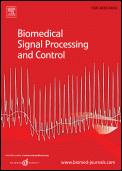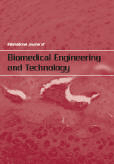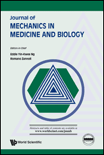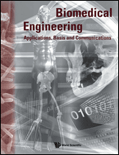
IEEE Open Journal of Engineering in Medicine and Biology
Scope & Guideline
Bridging the gap between medicine and technology.
Introduction
Aims and Scopes
- Interdisciplinary Research in Biomedical Engineering:
The journal emphasizes interdisciplinary studies that integrate engineering principles with biological and medical sciences, fostering collaborations that lead to innovative solutions for health-related issues. - Machine Learning and Artificial Intelligence Applications:
A core focus is on the application of machine learning and artificial intelligence in healthcare, including diagnostic tools, predictive modeling, and personalized medicine. - Wearable and Monitoring Technologies:
The journal explores advancements in wearable technologies and remote monitoring systems, emphasizing their role in continuous health assessment and management. - Computational Modeling and Simulation:
Research involving computational modeling and simulations to better understand biological systems and to design medical devices is a key area of interest. - Biomedical Imaging and Signal Processing:
The journal publishes studies on novel imaging techniques and signal processing methods that enhance diagnostic accuracy and treatment efficacy. - Rehabilitation Engineering and Assistive Technologies:
There is a strong focus on engineering solutions for rehabilitation, including robotic systems and assistive devices that improve patient outcomes.
Trending and Emerging
- Digital Twin Technology in Healthcare:
The integration of digital twin technology in healthcare is emerging as a significant theme, allowing for personalized patient care through virtual modeling and simulation of individual health profiles. - Emotion Recognition and Affective Computing:
There is a growing interest in emotion recognition systems that utilize physiological signals for mental health assessments, showcasing the importance of emotional well-being in comprehensive health monitoring. - Advanced Machine Learning Techniques:
Innovative machine learning methodologies, particularly deep learning approaches, are increasingly being applied to various medical fields, including imaging, diagnostics, and predictive analytics. - Telehealth and Remote Patient Monitoring:
The COVID-19 pandemic has accelerated the focus on telehealth solutions and remote patient monitoring technologies, making them a central theme in recent publications. - Wearable Health Technologies:
Wearable devices for real-time health monitoring are gaining traction, with research focusing on their design, effectiveness, and integration into everyday health management. - Sustainable and Eco-Friendly Biomedical Solutions:
Emerging studies are exploring eco-friendly materials and sustainable practices in biomedical engineering, reflecting a growing awareness of environmental impacts.
Declining or Waning
- Traditional Biomechanics Studies:
Research focused purely on traditional biomechanics without integrating modern technologies such as AI or advanced imaging techniques appears to be declining as the field evolves towards more technologically integrated approaches. - Basic Laboratory Studies:
There is a noticeable decrease in publications centered solely on basic laboratory experiments, with a shift towards studies that translate laboratory findings into clinical applications and real-world scenarios. - Single-Modal Monitoring Systems:
As the field moves towards more comprehensive health monitoring solutions, the focus on single-modal systems (e.g., only ECG or only EEG) is waning in favor of multimodal approaches that provide a more holistic view of patient health. - Conventional Rehabilitation Techniques:
Research exploring traditional rehabilitation methods is becoming less prevalent as innovative, technology-driven rehabilitation strategies gain traction.
Similar Journals

BME Frontiers
Bridging Research and Real-World Healthcare SolutionsBME Frontiers, published by the American Association for the Advancement of Science, is an innovative open-access journal dedicated to the burgeoning field of Biomedical Engineering. Since its establishment in 2020, this journal has aimed to bridge the gap between cutting-edge research and practical application, promoting advancements in biomedical technologies, medical devices, and healthcare solutions. Boasting impressive rankings within Scopus—64th among 398 in Medicine (miscellaneous) and 81st among 303 in Biomedical Engineering—BME Frontiers stands out as a significant contributor to scholarly communication, offering rich insights for researchers, professionals, and students alike. With consistent publication projected through 2024, the journal serves as an essential platform for disseminating high-quality research that can drive innovation and inspire new approaches in the healthcare sector.

Intelligent Medicine
Advancing medical practice with cutting-edge AI research.Intelligent Medicine, published by Elsevier, is a leading open-access journal dedicated to advancing the fields of Artificial Intelligence, Biomedical Engineering, Health Informatics, and related areas within Medicine. Since its inception in 2021, it has quickly established itself among the top tier of academic publications, holding a commendable Q2 ranking in several categories, including a rank of #51 in Health Informatics and #104 in Medicine (Miscellaneous) as of 2023. The journal aims to disseminate innovative research that harnesses AI technologies to improve healthcare outcomes, bridging the gap between cutting-edge technology and medical practice. With its open-access model, Intelligent Medicine ensures broad dissemination of research findings, facilitating collaboration and knowledge sharing among researchers, practitioners, and students globally. Located in Amsterdam, Netherlands, this journal plays a pivotal role in shaping the future of intelligent healthcare solutions, inviting submissions that push the boundaries of conventional medicine through creative and impactful research.

TECHNOLOGY AND HEALTH CARE
Exploring the Intersection of Care and TechnologyTECHNOLOGY AND HEALTH CARE, published by IOS PRESS, stands as a prominent interdisciplinary journal dedicated to the integration of technology within the healthcare sector. With an ISSN of 0928-7329 and an E-ISSN of 1878-7401, this journal has been a vital resource since its inception in 1993, providing insights and advancements in various categories including bioengineering, biomedical engineering, health informatics, and more. Though it currently holds a Q4 classification in several fields and Q3 in others, it actively contributes to the dialogue surrounding innovative methodologies and practices that enhance healthcare delivery. Researchers, professionals, and students will find the journal invaluable for its diverse range of studies that explore the convergence of technology and health. Its commitment to fostering impactful research continues to reinforce its relevance in the evolving landscape of healthcare technology.

Wearable Technologies
Unlocking Potential: The Future of Wearable Devices in MedicineWearable Technologies is an esteemed peer-reviewed journal published by CAMBRIDGE UNIV PRESS, focusing on the innovative intersection of technology and healthcare. Since its establishment in 2020, this Open Access journal has garnered significant recognition in the field of Biomedical Engineering, with a remarkable impact factor reflected in its top-tier rankings—Q1 in Biomedical Engineering and Rehabilitation, and Q2 in Human-Computer Interaction. Positioned as a leader in its domain, Wearable Technologies continually explores the advancements and applications of wearable devices, facilitating groundbreaking research that enhances user interaction and rehabilitation outcomes. With its robust Scopus rankings—including a 92nd percentile in Medicine Rehabilitation—this journal serves as an invaluable resource for researchers, professionals, and students keen on advancing the understanding and application of wearables in various fields. Based in Cambridge, United Kingdom, it aims to stimulate scholarly conversation and disseminate pivotal discoveries that shape the future of both technology and healthcare.

Biomedical Signal Processing and Control
Transforming healthcare with cutting-edge signal processing.Biomedical Signal Processing and Control is a premier academic journal published by ELSEVIER SCI LTD that stands at the forefront of the rapidly evolving fields of biomedical engineering, health informatics, and signal processing. With an impressive impact factor reflecting its scholarly influence and high standards of research, this journal has been recognized in the Q1 quartile category across multiple disciplines as of 2023. Specifically, it holds esteemed positions within Biomedical Engineering, Health Informatics, and Signal Processing, where it ranks in the top tier of its field on Scopus: #19/131, #21/138, and #47/303 respectively. Published continually from 2006 to 2024, the journal serves as a critical platform for researchers, healthcare professionals, and students, fostering innovation in signal processing techniques and their applications in biomedical systems. Access to cutting-edge research and methodologies makes it an indispensable resource for advancing knowledge and practice within these interdisciplinary domains.

ANNALS OF BIOMEDICAL ENGINEERING
Bridging the gap between engineering and medicine.ANNALS OF BIOMEDICAL ENGINEERING is a premier journal in the field of biomedical engineering, published by Springer. Established in 1972, this journal has become a vital resource for researchers, professionals, and students engaged in the rapidly evolving domain of biomedical technology. With a commendable impact factor and ranked in the 76th percentile among its peers as per Scopus, it exemplifies excellence in disseminating critical research findings. The journal covers a broad scope of topics related to the integration of engineering principles with medical and biological sciences, facilitating innovations that enhance healthcare outcomes. Although open access is not offered in this journal, it remains an essential platform for scholarly communication, contributing to the continuous advancement of knowledge in biomedical engineering. ANNALS OF BIOMEDICAL ENGINEERING is not only a bridge for academics to share groundbreaking research but also an influential guide for practical applications in medicine and health technologies, making it a fundamental publication for its readership.

Biomedical Physics & Engineering Express
Advancing Interdisciplinary Insights for Global HealthBiomedical Physics & Engineering Express, published by IOP Publishing Ltd, serves as a dynamic platform for the dissemination of groundbreaking research in the interdisciplinary domains of biomedical physics, engineering, and related fields. With a focus on innovative solutions for healthcare challenges, the journal extends its reach to a global audience, providing valuable insights that influence both academic research and practical applications. Operating under an open-access format, this journal ensures that vital scientific discoveries are readily available to researchers, professionals, and students alike. Ranking within the Q3 and Q4 quartiles across various categories—including Bioengineering and Biomedical Engineering—indicates its emerging influence in the scientific community since its inception in 2015. With an increasing footprint in Scopus rankings and a commitment to advancing knowledge in subfields such as biophysics and health informatics, Biomedical Physics & Engineering Express plays a crucial role in shaping future innovations in healthcare technology and patient care.

International Journal of Biomedical Engineering and Technology
Driving Progress in Biomedical Engineering and TechnologyThe International Journal of Biomedical Engineering and Technology, published by INDERSCIENCE ENTERPRISES LTD, serves as a pivotal platform for the dissemination of innovative research in the field of biomedical engineering. This journal, with ISSN 1752-6418 and E-ISSN 1752-6426, has been a valuable resource since its inception in 2007, boasting a converged publication timeline extending to 2024. Based in the United Kingdom, the journal aims to bridge the gap between engineering and biomedical sciences, facilitating interdisciplinary collaboration. As reflected in its 2023 Scopus ranking in the Q4 quartile of Biomedical Engineering, the journal remains accessible for researchers at various stages of their careers, contributing to its significance in promoting advancements in healthcare technologies. While currently not an open-access publication, the journal remains dedicated to enriching the biomedical engineering community by presenting novel research that addresses critical challenges, ultimately aiming to improve patient outcomes and drive innovation in medical devices and therapies.

Journal of Mechanics in Medicine and Biology
Transforming Medical Technologies through Mechanical ResearchThe Journal of Mechanics in Medicine and Biology, published by World Scientific Publishing Co Pte Ltd, serves as a critical platform for interdisciplinary research at the intersection of engineering and biomedical sciences. With an ISSN of 0219-5194 and E-ISSN of 1793-6810, this esteemed journal has been dedicated to exploring the mechanical principles that govern biological systems since its inception in 2008. Based in Singapore, it addresses a diverse range of topics, from biomaterials to biomechanics, contributing valuable insights into the field’s evolving landscape. Although currently positioned in Q4 of Biomedical Engineering according to the 2023 category quartiles, it is poised for growth and increased visibility within the scientific community, fostering innovation and collaboration among researchers, professionals, and students alike. The journal emphasizes the importance of cutting-edge research and its practical implications, making it a vital resource for those striving to enhance the future of medical technologies and biological understanding.

BIOMEDICAL ENGINEERING-APPLICATIONS BASIS COMMUNICATIONS
Fostering collaboration in the realm of biomedical engineering.BIOMEDICAL ENGINEERING-APPLICATIONS BASIS COMMUNICATIONS is a prominent journal dedicated to the dynamic field of biomedical engineering, published by WORLD SCIENTIFIC PUBL CO PTE LTD. Since its inception in 1992, the journal has provided a platform for the dissemination of high-quality research and innovative applications within the biomedical engineering domain. Despite its current Q4 ranking in multiple categories such as Bioengineering and Biomedical Engineering, the journal serves as an essential resource for researchers and professionals seeking to explore the latest developments and practical applications in this interdisciplinary field. The journal is based in Singapore, reflecting the region's growing influence in scientific research and technology. Although it does not offer open access, it continues to attract submissions that enrich the scientific dialogue within its community. With a commitment to fostering knowledge and research collaboration, this journal remains a vital contributor to the ongoing advancements in biomedical technology and engineering.